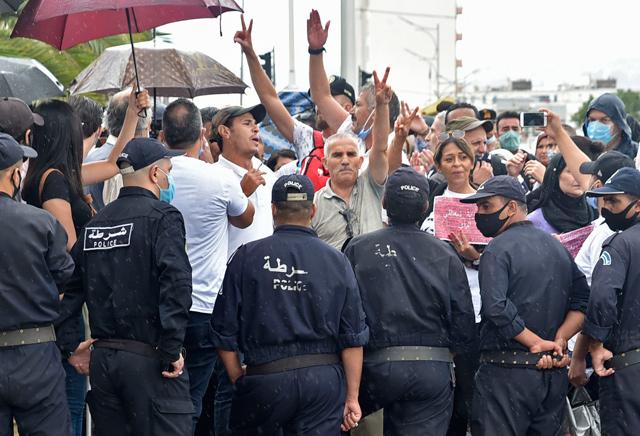- International News
- Web-2020-09-09 | 03:41 pm

Algerian journalist Khaled Drareni on Tuesday denied a slew of charges against him, insisting at his appeal that he was just doing his job in a case seen as a barometer of press freedoms in the country.
Battling a three-year jail term handed down in August for his coverage of the Algerian protests, Drareni was greeted by a crowd of supporters outside the court in the capital Algiers.
"From the first day, all I did was do my job as a journalist. I am here because I covered the 'Hirak' [movement] in all independence," he told the court.
Editor of the Casbah Tribune news site and correspondent for French-language channel TV5 Monde, Drareni, 40, was convicted of "inciting an unarmed gathering" and "endangering national unity" with his coverage of the year-long demonstrations that ousted longtime president Abdelaziz Bouteflika last year.
Press freedom watchdog Reporters Without Borders (RSF), for which Drareni also works, has condemned the three-year jail term and a fine of 50,000 dinar ($388) as "arbitrary, absurd and violent".
Drareni was arrested on March 7 while covering a protest led by the Hirak, and accused of having criticised Algeria's political system on Facebook, according to RSF.
"You can look again at all my posts to see if there was anything endangering national unity. I was recounting the facts," he said in court.
'Restricting coverage'
Very few reporters were allowed into the courtroom to cover Tuesday's hearings, and some 30 lawyers were due to speak.
The prosecutors called for a four-year jail term for Drareni. It was not known if the verdict would be handed down on Tuesday.
"The appeals trial of @khaleddrareni opened without almost any witnesses. Only about 10 journalists were allowed into the courtroom, compared with a 100 in the first hearings," RSF said in a tweet.
It added it was clear the "authorities want to limit very symbolic media coverage... by imposing without warning new restrictions on journalists' access".
Drareni was swept into the court complex by bus from Kolea prison outside Algiers, where he has been held since March 29. A small crowd of supporters met him, shouting "Khaled Drareni is a free journalist".
The appeals of co-defendants Samir Benlarbi and Sliman Hamitouche, both leading Hirak figures, were also being heard. They were each sentenced to two years, but with most of the term suspended, they have already been released and freely presented themselves to the court.
Since Drareni was jailed last month, thousands of people have signed petitions calling for his release, noting that his sentence was "the heaviest" handed down to a journalist in decades in Algeria.
Signatories include academics, lawyers and fellow journalists, as well as writer and independence war veteran Louisette Ighilahriz.
Press freedom 'symbol'
RSF Secretary General Christophe Deloire said authorities in the North African country had "made him [Drareni] a symbol of the defence of freedom of the press".
The appeal comes after the government agreed draft changes to the constitution over the weekend that will be submitted to parliament for approval ahead of a nationwide referendum in November.
President Abdelmadjid Tebboune said the reforms "respond to the demands of the popular movement".
Tebboune, a former premier under Bouteflika who was elected in December, has promised to break with the old regime, seen as synonymous with authoritarianism, corruption and nepotism.
But the proposed constitutional changes fall far short of the protest movement's demands for wholesale political reform and the departure of all Bouteflika-era officials.
Regular weekly protests organised by the Hirak movement petered out in March in the face of the coronavirus pandemic.
But as the referendum looms, they are expected to regain steam.
The CNLD prisoners' rights group says around 45 people linked to the Hirak are currently behind bars, with several of them facing trial.
In recent months, the government has accused journalists of spreading discord and subversion. During a meeting with the press in May, Tebboune hinted without naming Drareni that he may have been "an informer for foreign embassies".
RSF ranked Algeria 146 out of 180 countries and territories in its 2020 World Press Freedom Index, five places













